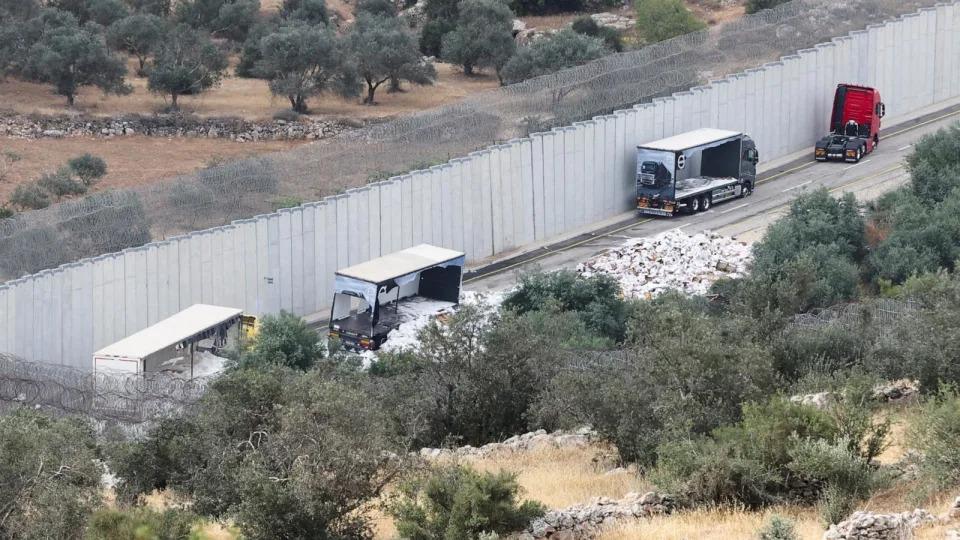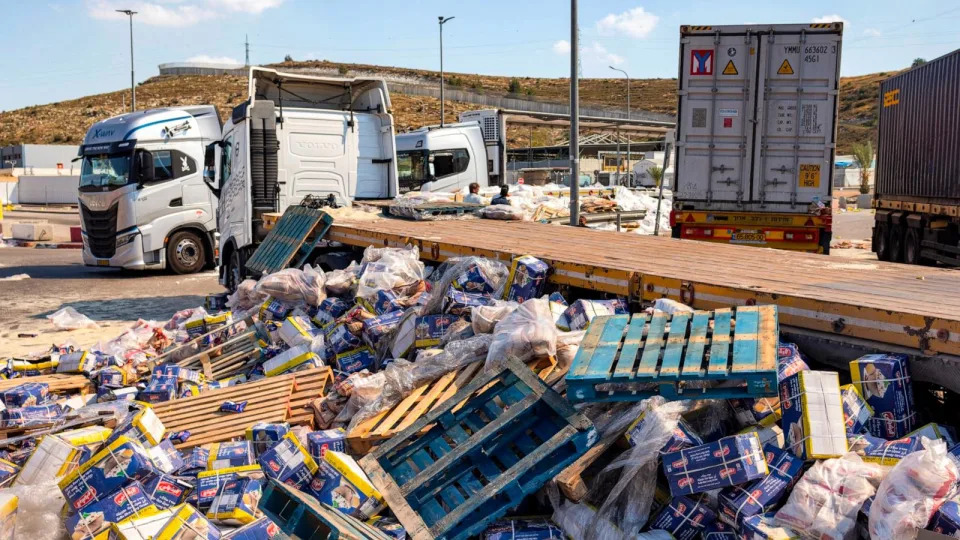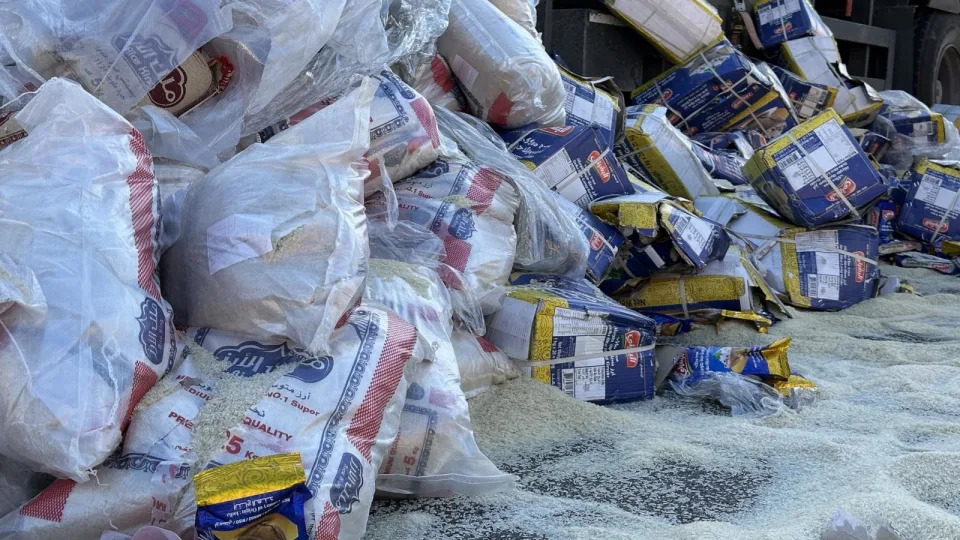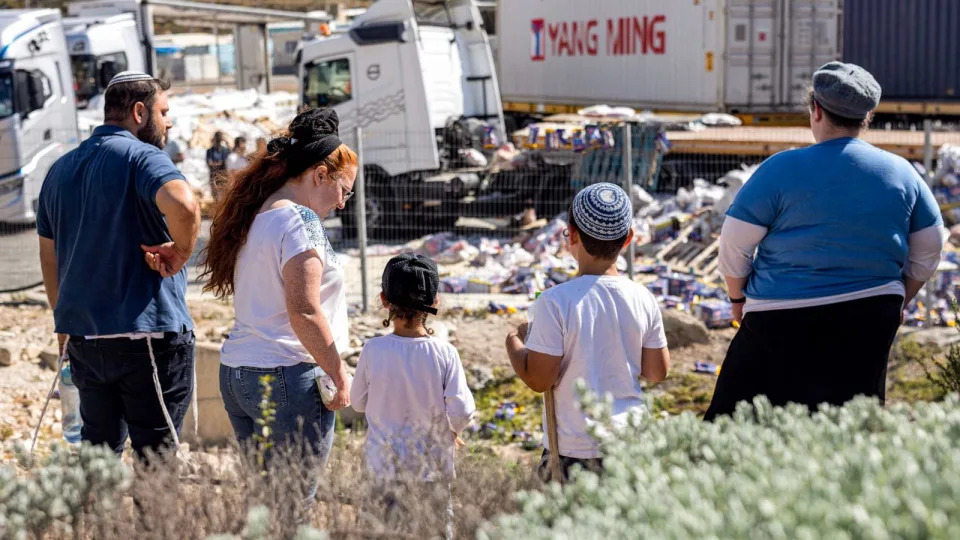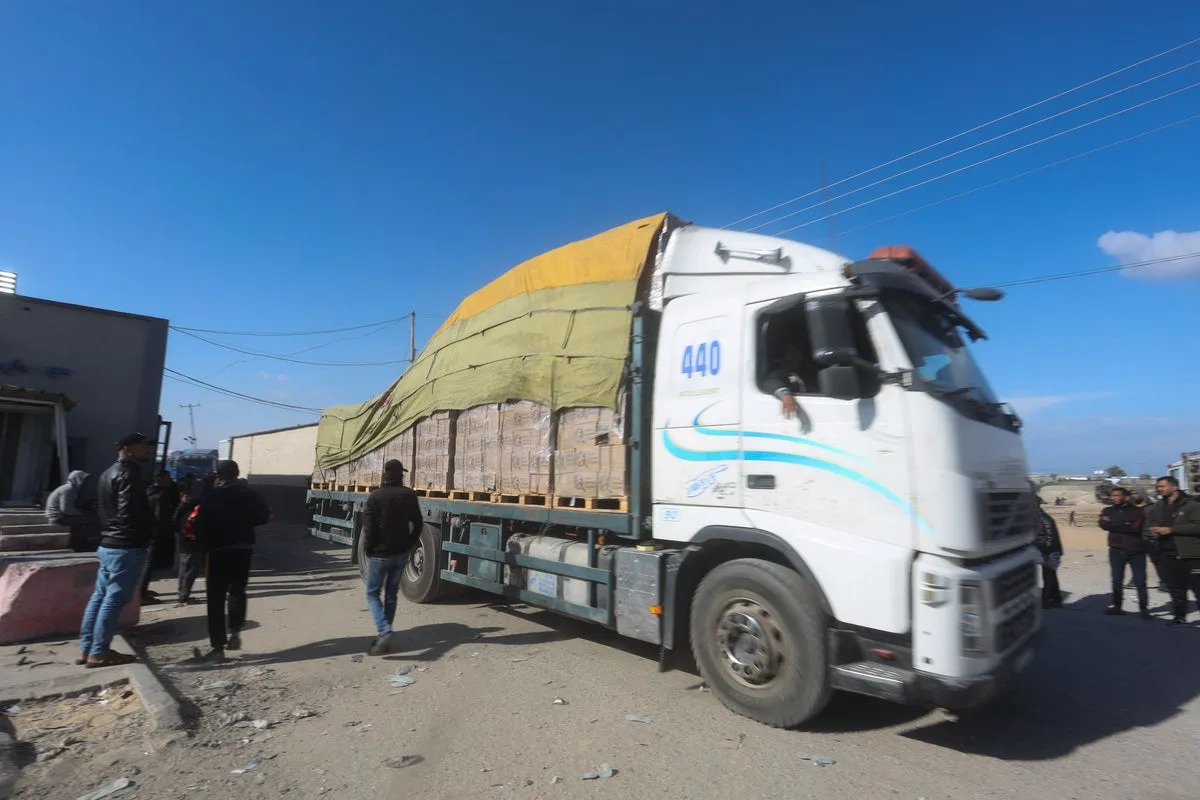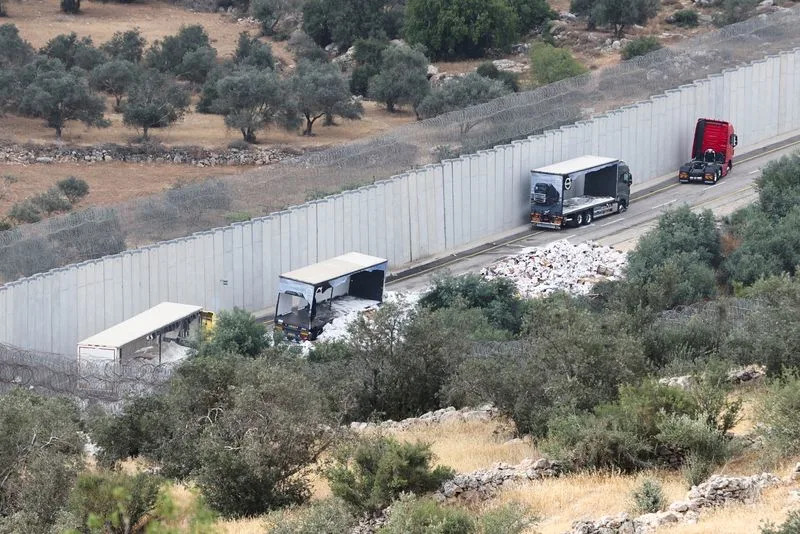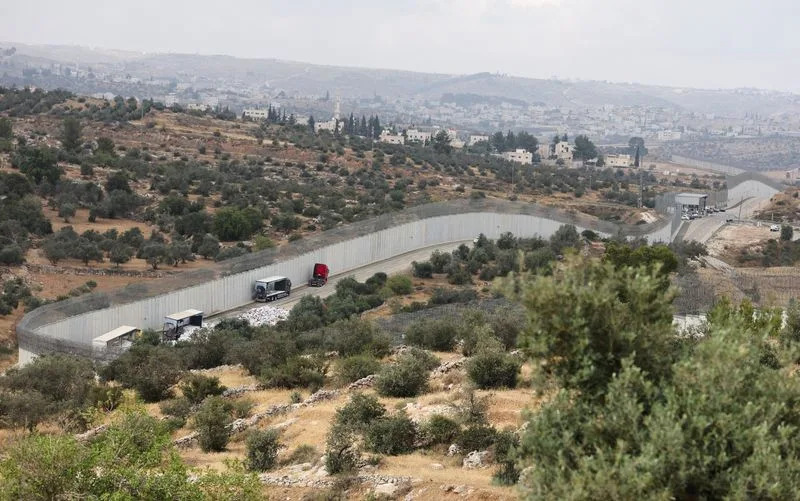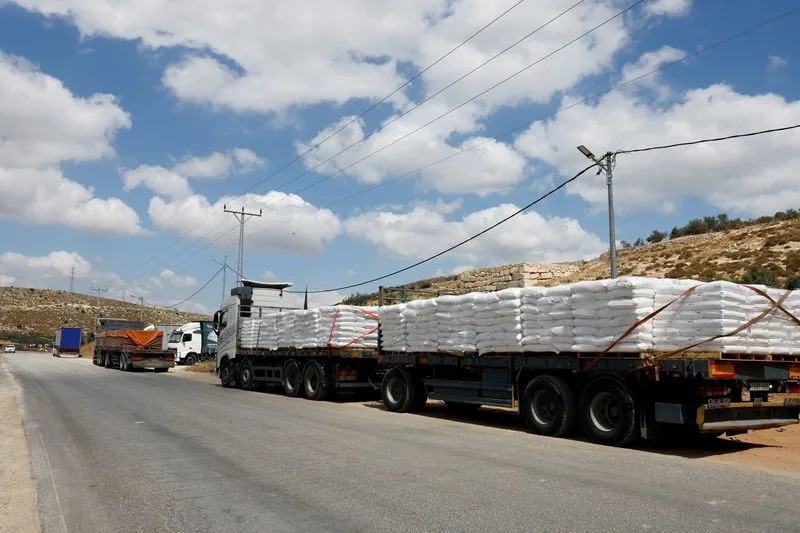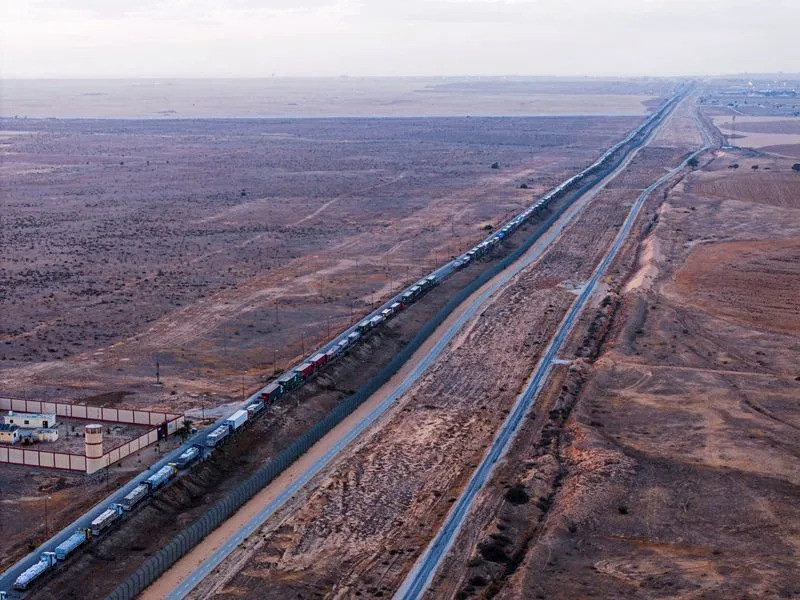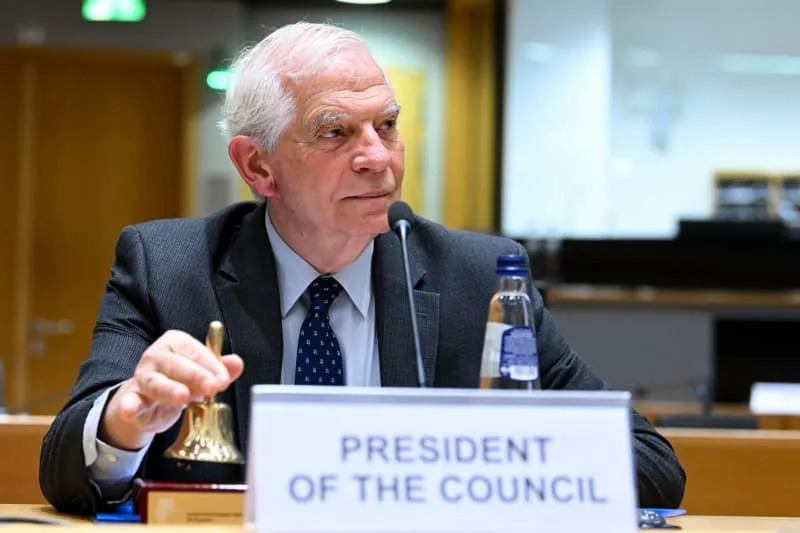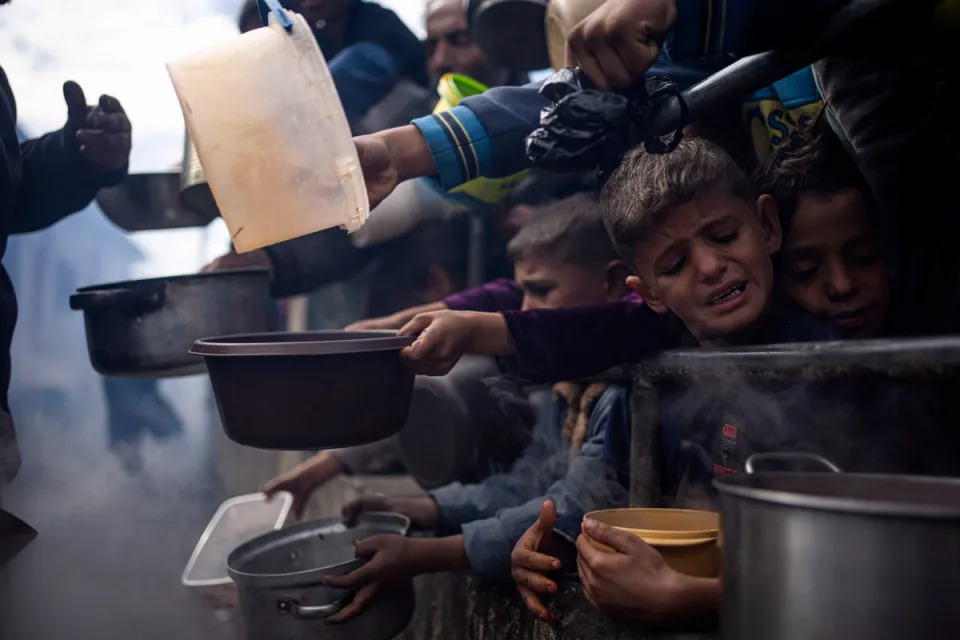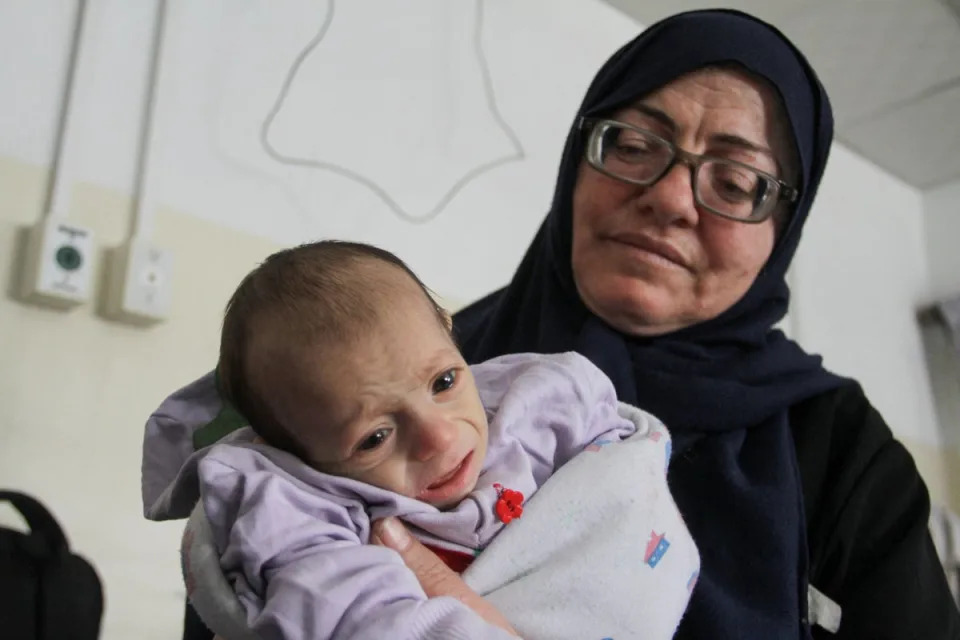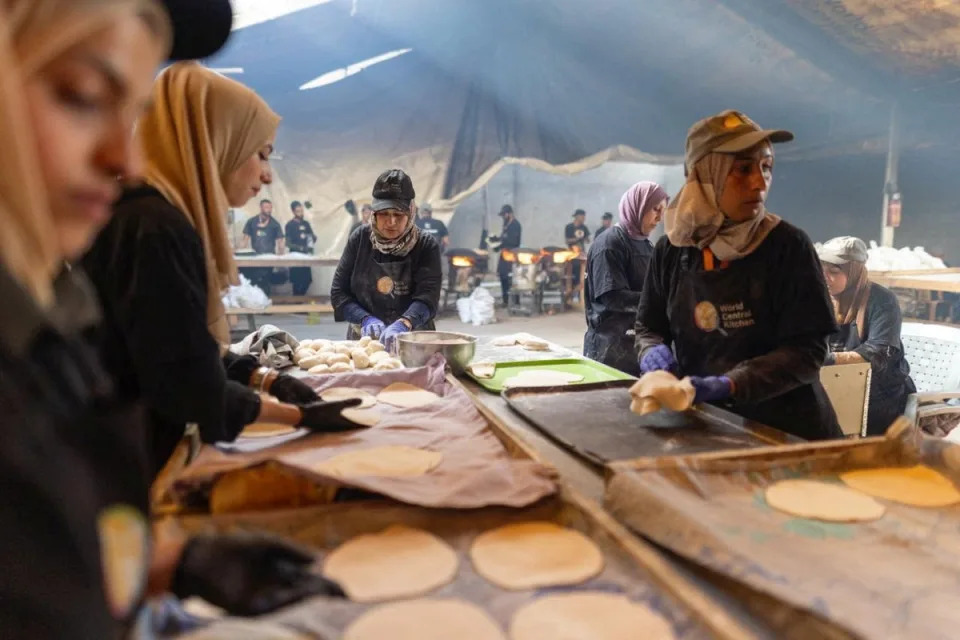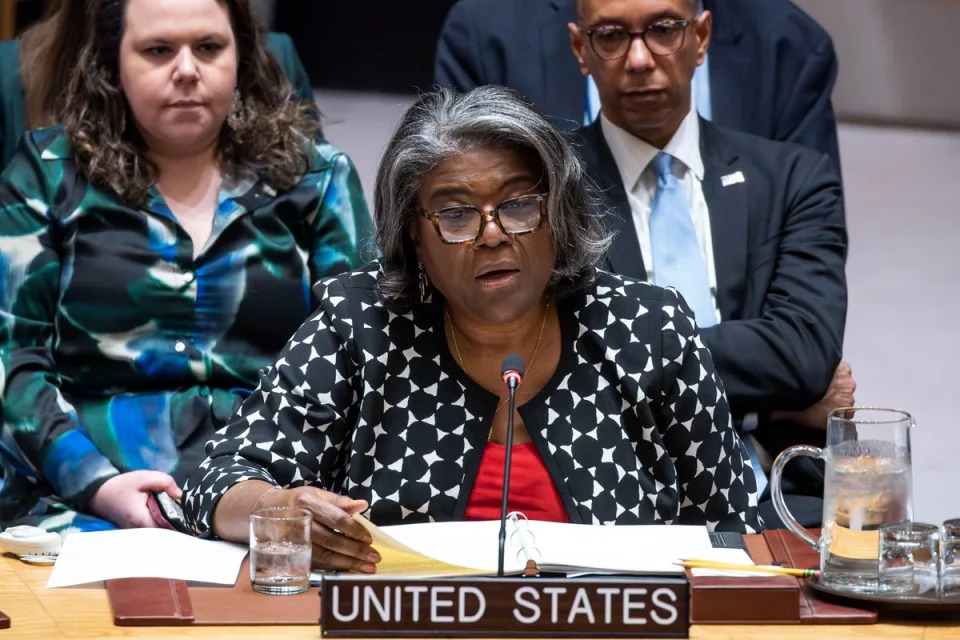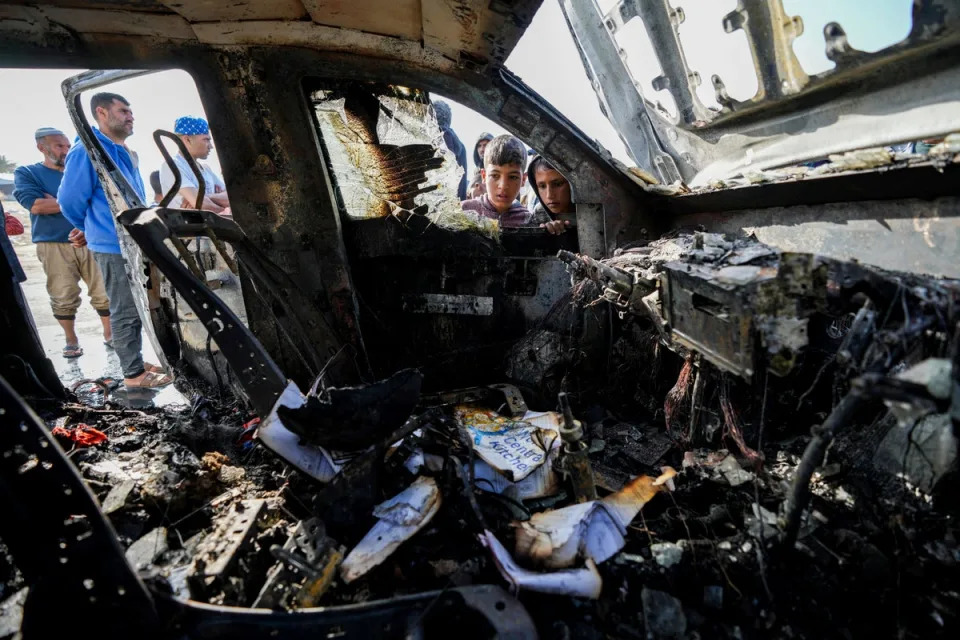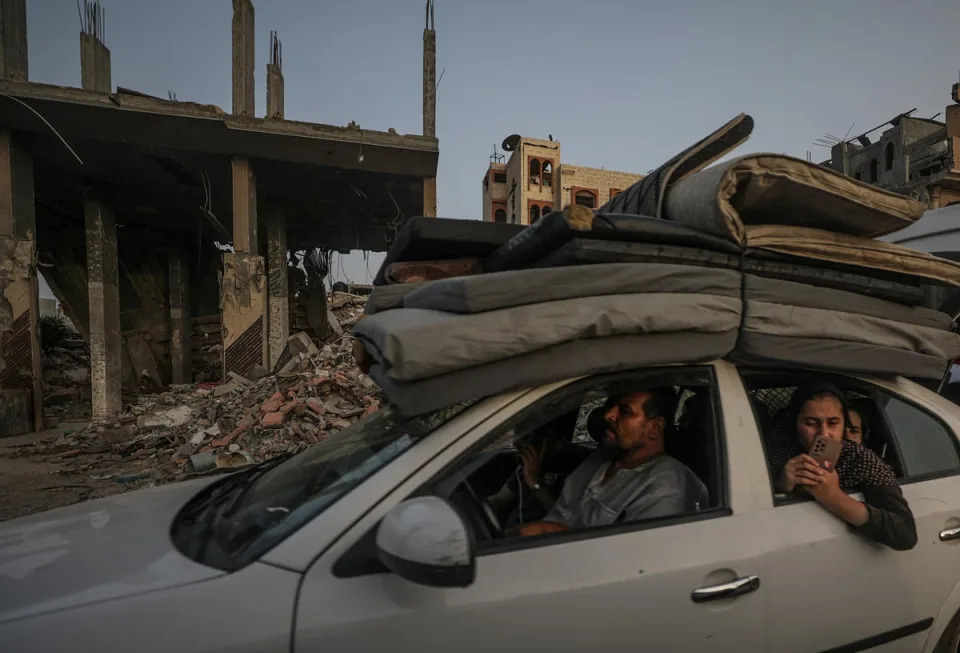JOSEPH KRAUSS
Updated Tue, May 14, 2024 at 1:58 AM MDT·5 min read
1.7k
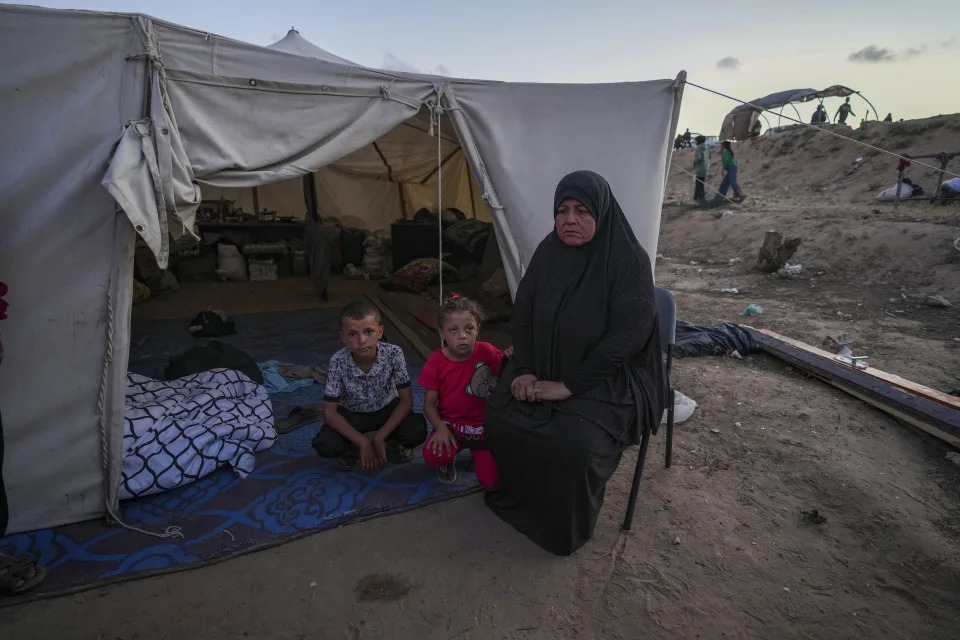
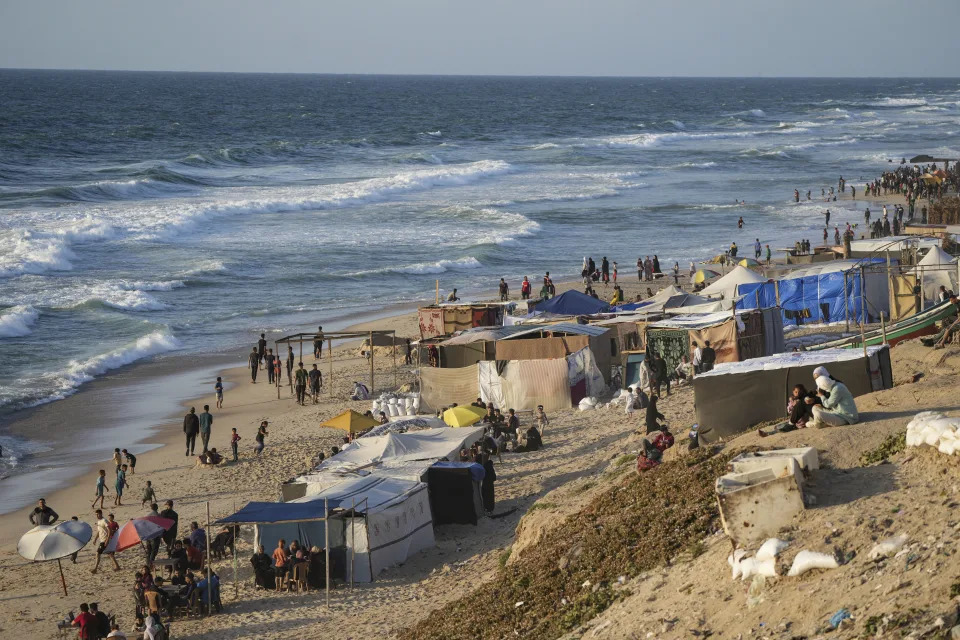

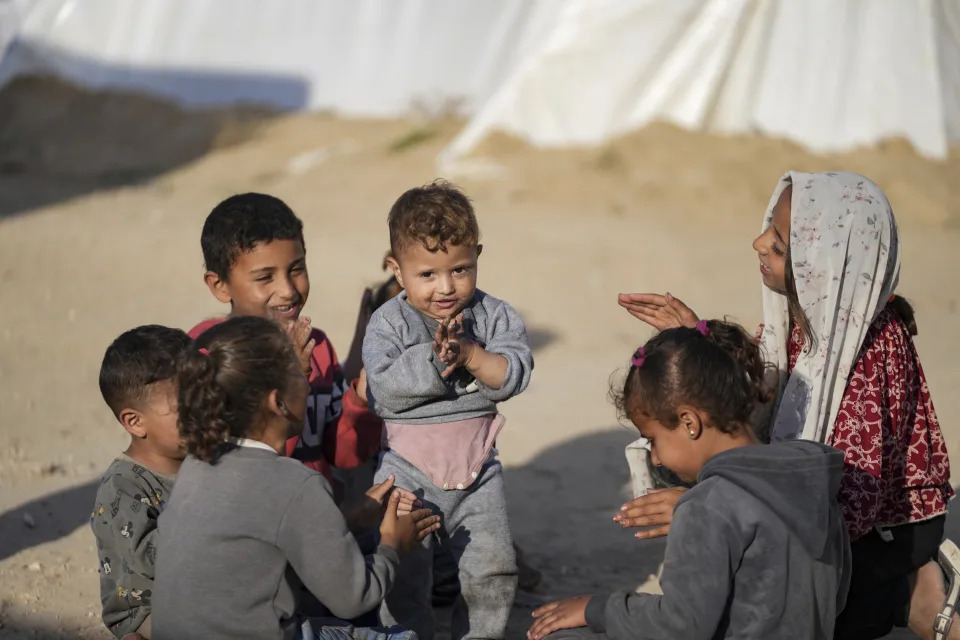
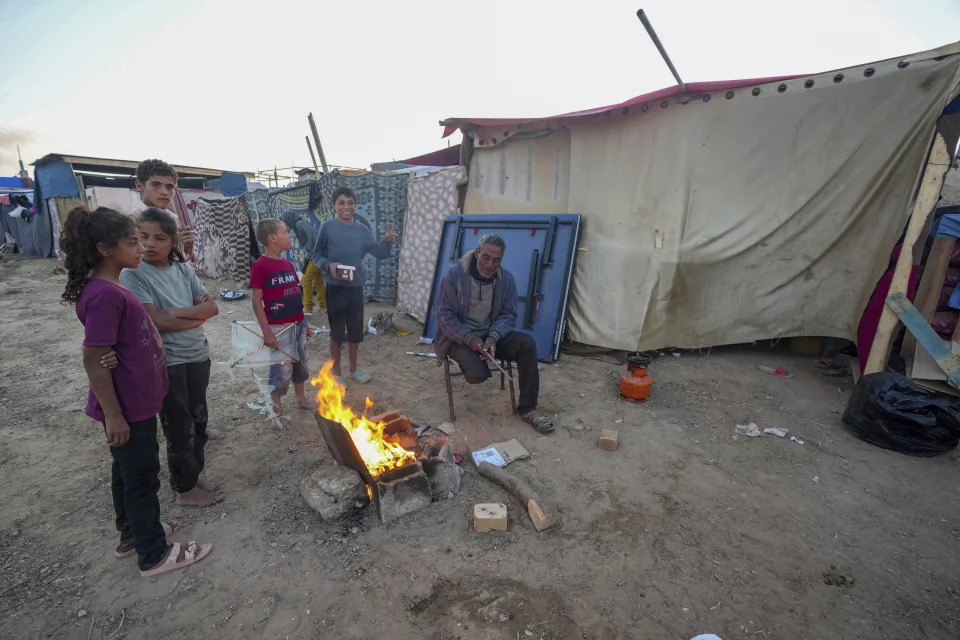

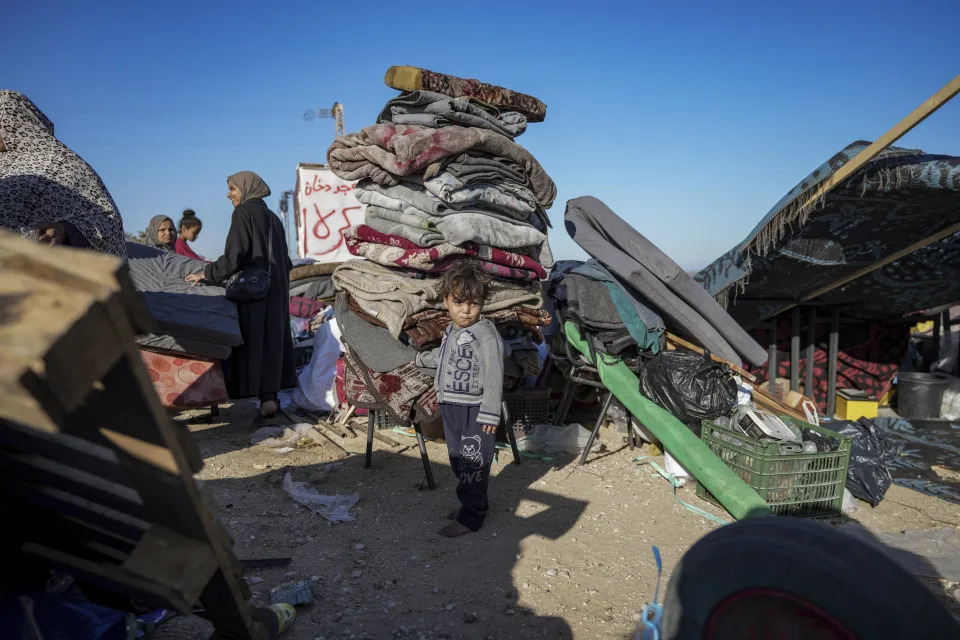
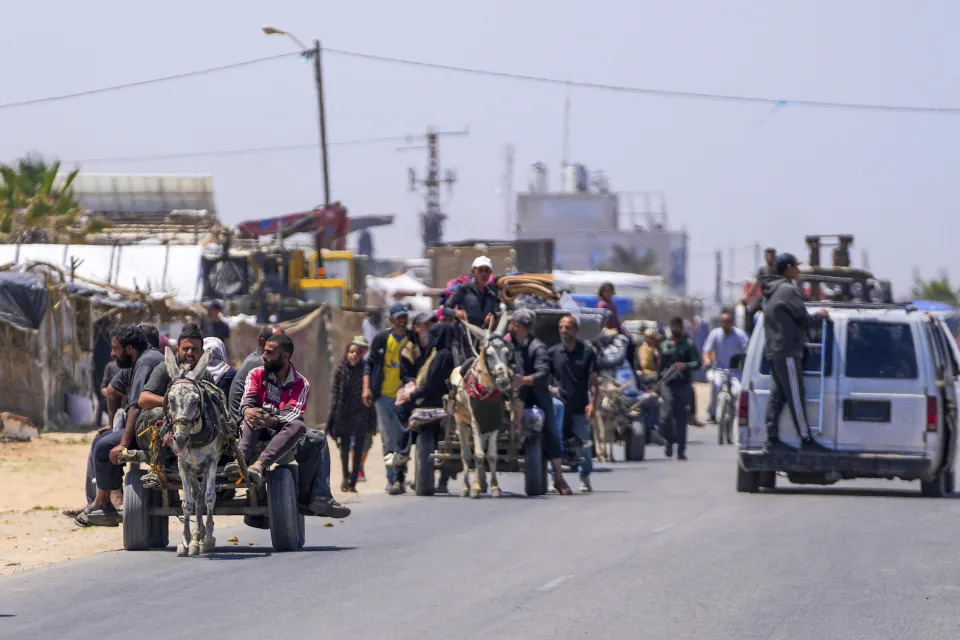


Israel Palestinians Nakba Day
A Palestinian woman sits in front of her makeshift tent with her grandchildren after been displaced by the Israeli air and ground offensive on the Gaza Strip at a camp in Deir al Balah, Monday, May 13, 2024. Palestinians on Wednesday, May 15, 2024, will mark the 76th year of their mass expulsion from what is now Israel. It's an event that is at the core of their national struggle, but in many ways pales in comparison to the calamity now unfolding in Gaza.
JERUSALEM (AP) — Palestinians on Wednesday will mark the 76th year of their mass expulsion from what is now Israel, an event that is at the core of their national struggle. But in many ways, that experience pales in comparison to the calamity now unfolding in Gaza.
Palestinians refer to it as the Nakba, Arabic for catastrophe. Some 700,000 Palestinians — a majority of the prewar population — fled or were driven from their homes before and during the 1948 Arab-Israeli war that followed Israel's establishment.
After the war, Israel refused to allow them to return because it would have resulted in a Palestinian majority within its borders. Instead, they became a seemingly permanent refugee community that now numbers some 6 million, with most living in slum-like urban refugee camps in Lebanon, Syria, Jordan and the Israeli-occupied West Bank.
In Gaza, the refugees and their descendants make up around three-quarters of the population.
Israel's rejection of what Palestinians say is their right of return has been a core grievance in the conflict and was one of the thorniest issues in peace talks that last collapsed 15 years ago. The refugee camps have always been the main bastions of Palestinian militancy.
Now, many Palestinians fear a repeat of their painful history on an even more cataclysmic scale.
All across Gaza, Palestinians in recent days have been loading up cars and donkey carts or setting out on foot to already overcrowded tent camps as Israel expands its offensive. The images from several rounds of mass evacuations throughout the seven-month war are strikingly similar to black-and-white photographs from 1948.
Mustafa al-Gazzar, now 81, still recalls his family's monthslong flight from their village in what is now central Israel to the southern city of Rafah, when he was 5. At one point they were bombed from the air, at another, they dug holes under a tree to sleep in for warmth.
Al-Gazzar, now a great-grandfather, was forced to flee again over the weekend, this time to a tent in Muwasi, a barren coastal area where some 450,000 Palestinians live in a squalid camp. He says the conditions are worse than in 1948, when the U.N. agency for Palestinian refugees was able to regularly provide food and other essentials.
“My hope in 1948 was to return, but my hope today is to survive,” he said. “I live in such fear,” he added, breaking into tears. “I cannot provide for my children and grandchildren.”
The war in Gaza, which was triggered by Hamas' Oct. 7 attack into Israel, has killed over 35,000 Palestinians, according to local health officials, making it by far the deadliest round of fighting in the history of the conflict. The initial Hamas attack killed some 1,200 Israelis.
The war has forced some 1.7 million Palestinians — around three quarters of the territory's population — to flee their homes, often multiple times. That is well over twice the number that fled before and during the 1948 war.
Israel has sealed its border. Egypt has only allowed a small number of Palestinians to leave, in part because it fears a mass influx of Palestinians could generate another long-term refugee crisis.
The international community is strongly opposed to any mass expulsion of Palestinians from Gaza — an idea embraced by far-right members of the Israeli government, who refer to it as “voluntary emigration.”
Israel has long called for the refugees of 1948 to be absorbed into host countries, saying that calls for their return are unrealistic and would endanger its existence as a Jewish-majority state. It points to the hundreds of thousands of Jews who came to Israel from Arab countries during the turmoil following its establishment, though few of them want to return.
Even if Palestinians are not expelled from Gaza en masse, many fear that they will never be able to return to their homes or that the destruction wreaked on the territory will make it impossible to live there. A recent U.N. estimate said it would take until 2040 to rebuild destroyed homes.
The Jewish militias in the 1948 war with the armies of neighboring Arab nations were mainly armed with lighter weapons like rifles, machine guns and mortars. Hundreds of depopulated Palestinian villages were demolished after the war, while Israelis moved into Palestinian homes in Jerusalem, Jaffa and other cities.
In Gaza, Israel has unleashed one of the deadliest and most destructive military campaigns in recent history, at times dropping 2,000-pound (900-kilogram) bombs on dense, residential areas. Entire neighborhoods have been reduced to wastelands of rubble and plowed-up roads, many littered with unexploded bombs.
The World Bank estimates that $18.5 billion in damage has been inflicted on Gaza, roughly equivalent to the gross domestic product of the entire Palestinian territories in 2022. And that was in January, in the early days of Israel’s devastating ground operations in Khan Younis and before it went into Rafah.
Yara Asi, a Palestinian assistant professor at the University of Central Florida who has done research on the damage to civilian infrastructure in the war, says it's “extremely difficult” to imagine the kind of international effort that would be necessary to rebuild Gaza.
Even before the war, many Palestinians spoke of an ongoing Nakba, in which Israel gradually forces them out of Gaza, the West Bank and east Jerusalem, territories it captured during the 1967 war that the Palestinians want for a future state. They point to home demolitions, settlement construction and other discriminatory policies that long predate the war, and which major rights groups say amount to apartheid, allegations Israel denies.
Asi and others fear that if another genuine Nakba occurs, it will be in the form of a gradual departure.
“It won’t be called forcible displacement in some cases. It will be called emigration, it will be called something else," Asi said.
"But in essence, it is people who wish to stay, who have done everything in their power to stay for generations in impossible conditions, finally reaching a point where life is just not livable.”
___
Associated Press journalists Wafaa Shurafa and Mohammad Jahjouh in Rafah, Gaza Strip, contributed.
Palestinians mark Nakba memorial day amid Gaza War
DPA
Wed, May 15, 2024
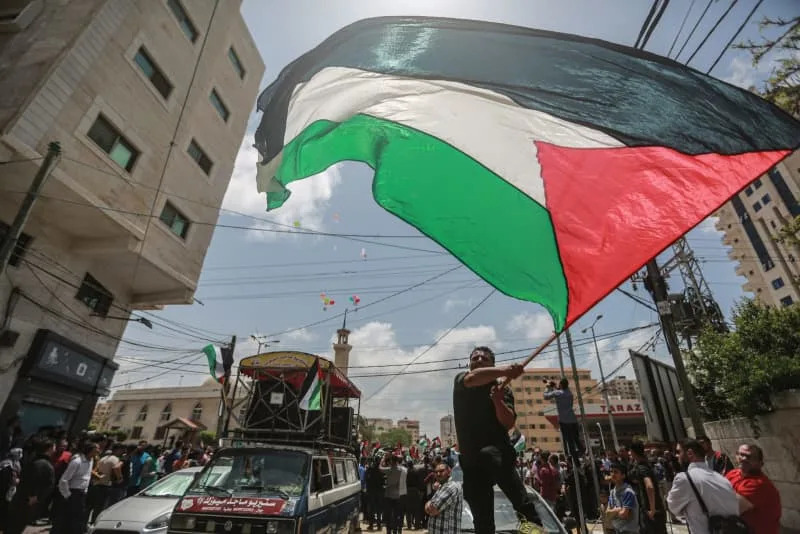
A man waves the Palestinian national flag during during a rally marking the 74th anniversary of Nakba Day (Memory of the Catastrophe). Palestinians are set to commemorate the loss of their homeland on Wednesday by observing Nakba Day (Catastrophe Day) which marks the flight of more than 700,000 Palestinians during the 1948 war that led to the establishment of the state of Israel. Mohammed Talatene/dpaMore
Palestinians are set to commemorate the loss of their homeland on Wednesday by observing Nakba Day (Catastrophe Day) which marks the flight of more than 700,000 Palestinians during the 1948 war that led to the establishment of the state of Israel.
The Nakba memorial day is held on May 15 every year. The state of Israel was declared on May 14, 1948. The day is marked with marches and demonstrations.
This year, the central event is planned in Ramallah in the West Bank, where sirens are expected to sound for 76 seconds to mark the 76 years since the Nakba.
Given the situation in the Gaza Strip, observers are predicting clashes with Israeli forces in the West Bank.
The United Nations puts the number of Palestinian refugees and their descendants at currently around 6 million.
Establishing a permanent home for the refugees, along with the status of Jerusalem, are seen as among the most complex problems in the Israeli-Palestinian conflict.
According to the Palestinian statistical office, there are about 14 million Palestinians around the world, with half of them living in the West Bank, East Jerusalem, the Gaza Strip and Israel.
Around 20% of Israel's population of almost 10 million are Arabs.
Palestinians mark 1948 Nakba in the shadow of war in Gaza
Wed, May 15, 2024
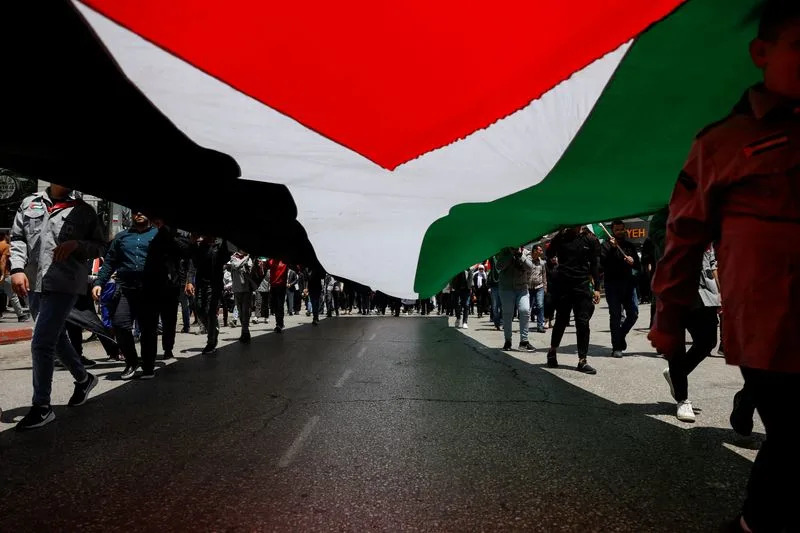

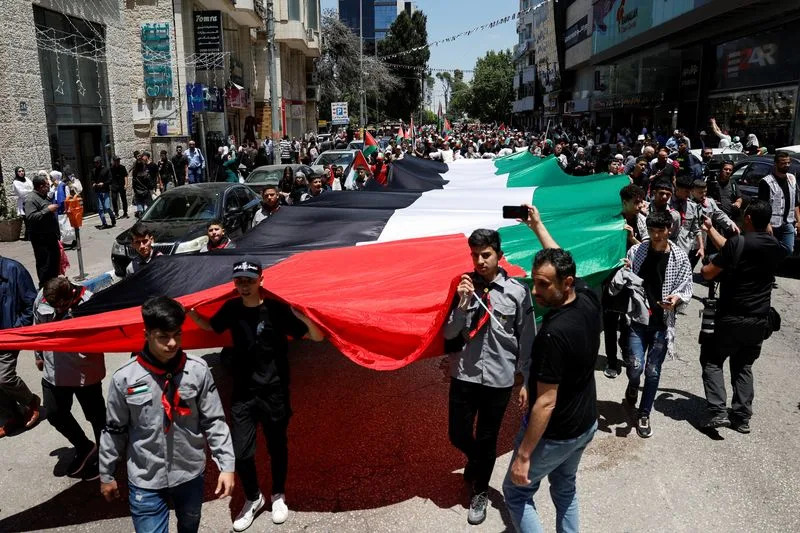
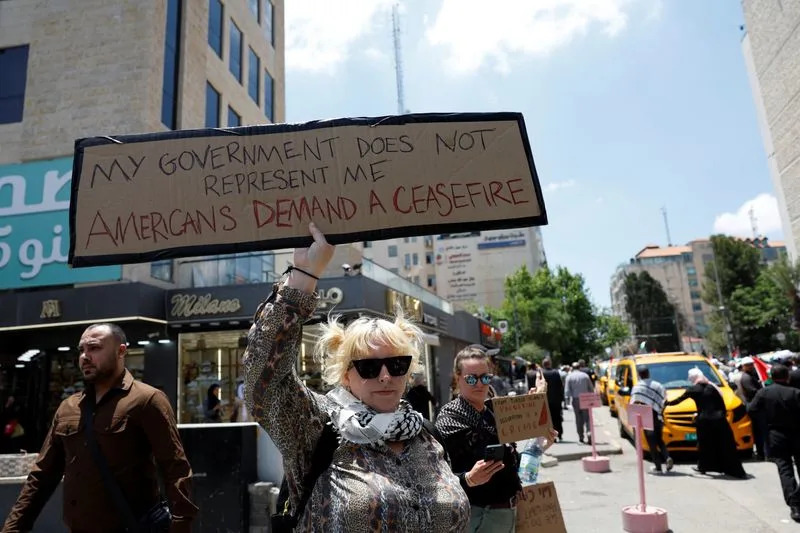
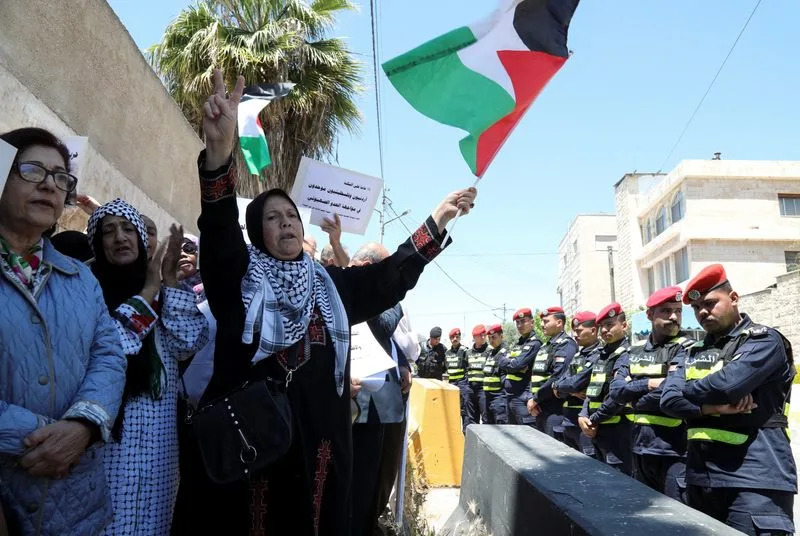
By Mohammad Salem and James Mackenzie
GAZA/JERUSALEM (Reuters) - Palestinians commemorated the 1948 "Nakba" or catastrophe, on Wednesday, marking the time when hundreds of thousands were dispossessed of their homes in the war at the birth of the state of Israel, as fighting raged amid the rubble in Gaza.
The Nakba has been one of the defining experiences for Palestinians for more than 75 years, helping to shape their national identity and casting its shadow on their conflicted relationship with Israel in the decades since.
This year's commemoration has been dominated by the plight of around two million Palestinians in Gaza, most of whom are living in temporary shelters after being displaced from their homes by the Israeli campaign launched in the wake of the Hamas-led attack on Israel last October.
"There is no catastrophe worse than this one," said 80-year-old Umm Mohammed, who survived the original Nakba as a child in the southern town of Beersheba before coming to Gaza, where she has spent most of her life and where she now lives in a tent in the southern city of Rafah.
"I've been here for about 80 years and a catastrophe like this, I have not seen. Our homes have gone, our children have gone, our property has gone, our gold has gone, our incomes have gone - nothing is left. What is left for us to cry over?"
The seven-month-old Israeli campaign, which has left much of the Gaza Strip a wasteland of rubble and wrecked buildings, has killed more than 35,000 Palestinians and displaced most of the population, drawing fears among many of a second Nakba in which they would be forced from Gaza altogether.
For many of the descendants of the 1948 refugees, keeping the memory alive of what their parents and grandparents lost remains an important priority. But for some, the experience of the past months has superseded the old stories of families being driven from their villages.
"My mother and father told me about the Nakba, the first one, but this Nakba here is worse," said 58-year-old Faridah Abu Artema, sitting in a tent encampment near Rafah. "This is destruction. They've destroyed us - what we have seen, no one else has seen. This is a tragedy."
The May 15 Nakba day commemoration marks the start of the 1948 war, when neighbouring Arab states attacked Israel a day after the new state declared its independence following the withdrawal of British forces from what was then called Palestine.
REFUGEE CAMPS
The fighting lasted for months and cost thousands of lives, with almost 800,000 Palestinians fleeing their homes or driven away from villages in what is now Israel, most into makeshift camps like the ones now occupied by the displaced of Gaza.
Over the years, dozens of refugee camps have grown into densely built up urban townships spread throughout the Middle East, where the 1948 refugees and their descendants make up almost half the total Palestinian population.
More than 5.9 million Palestinians are currently registered as refugees in the West Bank, the Gaza Strip, Jordan, Lebanon and Syria, according to United Nations figures, in addition to a diaspora population across the world.
Events marking the Nakba anniversary were also held in Ramallah, the main city in the occupied West Bank, where thousands bearing Palestinian flags marched, carrying signs with the names of villages of their grandparents.
A 20-year-old student at Bir Zeit University, resident in the Jalazoun refugee camp north of Ramallah, was killed in a clash with Israeli forces.
Demonstrations were also planned in Jordan and Lebanon where some two million Palestinians are registered as refugees by the U.N. Palestinian aid agency UNRWA.
(Additional reporting by Ali Sawafta in Ramallah; Writing by James Mackenzie, Editing by William Maclean)
Palestinians in Israel demand refugee return on 'Nakba' anniversary
Tue, May 14, 2024

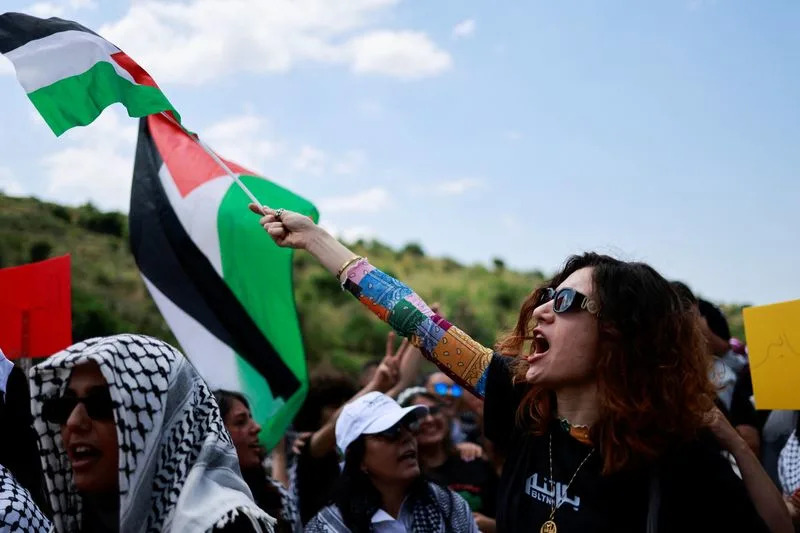


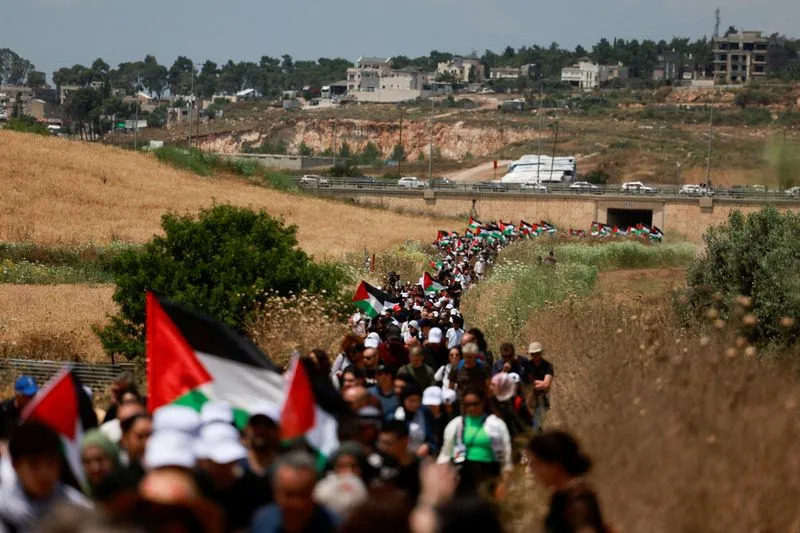
Palestinians living in Israel mark the 76th anniversary of the Nakba, near Haifa
By Henriette Chacar
NEAR HAIFA, Israel (Reuters) - Thousands of flag-waving Palestinians marched in northern Israel on Tuesday to commemorate the flight and forced flight of Palestinians during the 1948 war surrounding Israel's creation, and to demand the right of refugees to return.
Many of the about 3,000 people also called for an end to the war in Gaza as they took part in the march near the city of Haifa marking the "Nakba", or "catastrophe", when hundreds of thousands of Palestinians fled or were driven out during the 1948 war that accompanied Israel's creation.
Many held up Palestinian flags and wore keffiyeh head scarves during the annual Return March, a rare Palestinian demonstration permitted to go ahead in Israel as the war in the Gaza Strip rages on.
Many clutched water bottles, and some pushed strollers, as they marched along a dirt path. One person held aloft half a watermelon, which became a Palestinian symbol after Israeli bans on the flag because of its red, green and black colours. Others called for Palestinians to be freed from Israeli occupation.
"This is part of our liberation," said Fidaa Shehadeh, coordinator of the Women Against Weapons Coalition and former member of the Lydd Municipality Council. "It's not only about ending the occupation but also about allowing all refugees the ability to return to the homeland."
Some 700,000 Palestinians left or were forced to flee their homes during the 1948 war. Shehadeh said her family was forcibly displaced from the coastal village of Majdal Asqalan, with some fleeing to the city of Lydd in what became Israel and others to Gaza. She considered herself an internally displaced person.
She said "refugees remain refugees" 76 years later.
Shehadeh said her uncles and aunts in Gaza, whom she said she was last able to visit in 2008 with Israeli approval, are now displaced again as they try to escape Israel's bombardment.
They do not know if or when they will be able to return to their homes, she said.
Shehadeh said she travels to the West Bank almost weekly to top up e-SIMs for her Gaza relatives so that they can remain in contact.
"Sometimes we wait for days to receive a 'good morning' message, that's how we know whoever sent it is still alive," she said.
Over 35,000 Palestinians have been killed in the Gaza war, Gaza health officials say. Israel began its offensive in Gaza, which is governed by Hamas, after the Oct. 7 raid led by gunmen from the Islamist militant group in which 1,200 people were killed in Israel and 253 abducted, according to Israeli tallies.
ARABS IN ISRAEL
Arabs make up about a fifth of Israel's population. They hold Israeli citizenship while many identify with Palestinians in the occupied West Bank, East Jerusalem and Gaza.
Every year, participants of the march, among them descendants of Palestinians who were internally displaced during the 1948 war, visit a different village that was destroyed or depopulated by Zionist militias.
Israel rejects the Palestinian right of return as a demographic threat to a country it describes as the nation-state of the Jewish people. It has said Palestinian refugees must settle in their host countries or in a future Palestinian state.
Kareem Ali, 12, held a sign reading "My grandparents lived in Kasayir" as he marched beside his father, Hamdan, referring to one of the villages being remembered this year. The family now resides in Shefa'amr in northern Israel.
For many years, Hamdan's father, a farmer, would pass by the depopulated village and pick figs from a tree that remained, Hamdan said.
"Our memory is our power," he said.
Some Arab citizens say they have experienced increased hostility during the Gaza war, with hundreds facing criminal proceedings, disciplinary hearings and expulsions from universities or jobs, Haifa-based rights group Adalah says.
Israeli police have said they are combating incitement to violence.
BADIL, a Bethlehem-based organisation advocating for refugee rights, estimated that by the end of 2021 some 65% of 14 million Palestinians globally were forcibly displaced persons, including
refugees and citizens of Israel who were internally displaced.
Some 5.9 million people are registered with the U.N. agency for Palestinian refugees (UNRWA). Most people in Gaza are refugees.
(Reporting by Henriette Chacar; Editing by Timothy Heritage)
Palestinians mark 'Nakba' anniversary as thousands flee Gaza's Rafah
AFP
Tue, May 14, 2024 at 10:57 PM MDT
Tens of thousands of civilians fled the southern Gaza city of Rafah ahead of a threatened Israeli ground offensive, as Palestinians on Wednesday mark the anniversary of their "Nakba" or "catastrophe" of 1948.
During the war that accompanied Israel's creation, around 760,000 Palestinians fled or were driven from their homes and many took refuge in what would later become the Gaza Strip and the West Bank.
Wednesday's commemoration of the "Nakba" comes as multiple battles between Israeli troops and Hamas militants across the Gaza Strip force waves of Palestinian mass displacement.
Nearly 450,000 Palestinians have been displaced from Rafah since May 6, and around 100,000 from northern Gaza, UN agencies said.
That means around a quarter of Gaza's population of 2.4 million people have been displaced again in about one week.
UN chief Antonio Guterres repeated his call for a humanitarian ceasefire to allow more aid into the besieged territory.
"I reiterate my appeal for an immediate humanitarian ceasefire in Gaza and for the release of all hostages. I call for the Rafah crossing to be re-opened immediately and for the unimpeded humanitarian access throughout Gaza," he posted Tuesday on social media site X.
The war and siege have triggered a humanitarian crisis in Gaza, with the UN repeatedly lamenting aid restrictions as famine stalks the north.
Since Israeli troops moved into eastern Rafah, the aid crossing point from Egypt has remained closed and the nearby Kerem Shalom crossing lacks "safe and logistically viable access", a UN report said late Monday.
Qatar, which has been mediating peace talks, said Gazans "have not received any aid" since May 9.
- Attack on aid convoy -
Israeli police on Tuesday said they had opened an investigation after right-wing activists stopped and ransacked at least seven Gaza-bound aid trucks coming from Jordan, leaving food spilt on the road.
One of the activists, Hana Giat, said that with hostages still held by Hamas militants, "no humanitarian aid should go in before our hostages are out, safe in their homes".
Both the United States, which called it "a total outrage", and Britain, said they would raise concerns about the incident with Israel's government.
EU foreign policy chief Josep Borrell called on Israeli authorities to stop the attacks and hold those responsible to account.
"I'm outraged by the repeated & still unchecked attacks perpetrated by Israeli extremists on aid convoys on their way to Gaza, including from Jordan. Hundreds of thousands of civilians are starving," Borrell posted on X late Tuesday.
The bloodiest-ever Gaza war erupted after Hamas's October 7 attack on Israel, which killed more than 1,170 people, mostly civilians, according to an AFP tally of Israeli official figures.
Militants also seized about 250 hostages, 128 of whom Israel estimates remain in Gaza, including 36 the military says are dead.
Israel's relentless bombardment and ground offensive in Gaza have since killed at least 35,173 people, mostly civilians, according to the Gaza health ministry.
Clashes have rocked densely crowded Rafah but also flared again in northern and central Gaza months after troops and tanks first entered those areas.
At least five people were killed, including a woman and her child, and several others wounded, in two Israeli air strikes on Gaza City on Tuesday night, according to Gaza's civil defence agency.
Israel last week defied a chorus of warnings -- including from top ally Washington which paused a shipment of bombs -- and sent troops and tanks into the east of Rafah to pursue militants.
- 'No clarity on how to stop war' -
Battles and heavy Israeli bombardments have been reported around Rafah as well as in Gaza City and Jabalia refugee camp in the north, and Nuseirat camp in the centre.
At Gaza City's Al-Ahli hospital, the wounded and the dead arrived.
A shirtless man, his chest smeared with blood, lay on a hard cot hooked up to a monitor. Outside, several men carried a shrouded corpse and placed it in the shade of a tree blooming red flowers.
Despite threatening to withhold some arms over concerns of a Rafah assault, US President Joe Biden's administration informed Congress on Tuesday of a $1 billion weapons package for Israel, official sources told AFP.
US State Department spokesman Vedant Patel earlier Tuesday said that while Washington backed military pressure on Hamas, it was not the only way to "fully defeat" the militants.
Patel reiterated Washington's position that, without a political plan for Gaza's future, militants "will keep coming back and Israel will continue to remain under threat", leading to "this continued cycle of violence".
Momentum had been building in truce negotiations, mediator Qatar's prime minister said on Tuesday, but "what happened with Rafah has set us backward".
Prime Minister Mohammed bin Abdulrahman Al-Thani said that "right now we are on a status of almost a stalemate".
Egypt and the United States have also been mediating.
"There is no clarity how to stop the war from the Israeli side. I don't think that they are considering this as an option," Sheikh Mohammed said.
On the eve of the "Nakba" commemoration, thousands of people took part in an annual march that took them through the ruins of villages that Palestinians were expelled from during the 1948 war that led to Israel's creation.
Eyes glistening with tears, Abdul Rahman al-Sabah, 88, recalled how members of the Haganah, a Zionist paramilitary group, forced his family from al-Kassayer and "blew up our village".
Palestinians say Gaza war like enduring a second 'Nakba'
AFP
Wed, May 15, 2024
As the Gaza war raged on, Palestinians on Wednesday marked the anniversary of the Nakba, or "catastrophe", of mass displacement during the creation of the state of Israel 76 years ago.
Thousands marched in cities across the Israeli-occupied West Bank, waving Palestinian flags, wearing keffiyeh scarves and holding up symbolic keys as reminders of long-lost family homes.
Inside the besieged Gaza Strip, where the Israel-Hamas war has ground on for more than seven months, scores more died in the fighting sparked by the Hamas attack of October 7.
"Our 'Nakba' in 2023 is the worst ever," said one displaced Gaza man, Mohammed al-Farra, whose family fled their home in Khan Yunis for the coastal area of Al-Mawasi.
"It is much harder than the Nakba of 1948."
Palestinians everywhere have long mourned the events of that year when, during the war that led to the establishment of Israel, around 760,000 Palestinians fled or were driven from their homes.
But 42-year-old Farra, whose family was then displaced from Jaffa near Tel Aviv, said the current war is even harder.
"When your child is accustomed to all the comforts and luxuries, and suddenly, overnight, everything is taken away from him... it is a big shock."
- West Bank rallies -
Thousands marched in the West Bank city of Ramallah, as well as in Nablus, Hebron and elsewhere, carrying banners denouncing the occupation and protesting the war in Gaza.
"There's pain for us, but of course more pain for Gazans," said one protester, Manal Sarhan, 53, who has relatives in Israeli jails that have not been heard from since October 7.
"We're living the Nakba a second time."
Wednesday's commemorations and marches -- held a day after Israel's Independence Day -- come as the Gaza war has brought a massive death toll and the forced displaced of most of the territory's 2.4 million people.
A devastating humanitarian crisis has plagued the territory, with the United Nations warning of looming famine in the north.
Ahmed al-Akhras, 50, who was displaced from central Gaza to Rafah in the far south, also said the war was worse than anything Palestinians have endured before.
"Through my experience and conversations with those who lived through the Nakba... the bombings, destruction, displacement, killing and annihilation occurring in this war are unprecedented throughout history," he said.
By comparison, he said, back in 1948 -- when his own family fled the destroyed village of Wadi Hunayn in what is now Israel -- for most people "the suffering was limited to forced displacement".
- 'We're not free' -
The bloodiest-ever Gaza war erupted after Hamas's October 7 attack on Israel, which killed more than 1,170 people, mostly civilians, according to an AFP tally of Israeli official figures.
Militants also seized about 250 hostages, 128 of whom Israel estimates remain in Gaza, including 36 the military says are dead.
Israel's relentless bombardment and ground offensive in Gaza have since killed at least 35,233 people, mostly civilians, according to the Gaza health ministry.
With the Middle East peace process stalled for many years already, enmity between Israel's leadership and Palestinian factions has reached fever pitch, while the conflict has also sparked a global wave of pro-Palestinian demonstrations.
At the Ramallah rally, 16-year-old Ahmed Nomas said: "We want the world to stop seeing Palestinians as terrorists and to realise that we have no rights."
"We are not free to move," said Nomas, whose family has lived in the West Bank refugee camp of Qalandia since they were ousted from their village near Jerusalem in 1948.
"The Israeli soldiers are always checking or monitoring our movements. It's not a life."
The West Bank has been occupied by Israel since 1967 and is home to about 490,000 Israeli settlers who live in communities considered illegal under international law.
Violence has surged since October 7, with at least 499 Palestinians killed, according to the health ministry, and at least 20 Israelis dead according to an AFP tally based on official Israeli figures.
As on many others days, Palestinians mourned a violent death on Wednesday -- a young man officials said was shot dead by Israeli forces during an altercation following the Nakba rally in Ramallah.
The army did not immediately comment on the death of the man, identified as Ayser Muhammad Safi, 20, a student at Birzeit University, by the Palestinian news agency Wafa.
As his bloodied body, wrapped in a blue sheet, was taken to a morgue, tearful onlookers screamed and chanted "Allahu akbar", or God is greatest, and one young woman fainted.

